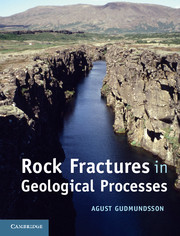Book contents
- Frontmatter
- Contents
- Preface
- Acknowledgements
- 1 Introduction
- 2 Stress
- 3 Displacement and strain
- 4 Relation between stress and strain
- 5 Loading of brittle rocks to failure
- 6 Stress concentration
- 7 Theories of brittle failure of rocks
- 8 Extension fractures and shear fractures
- 9 Displacements and driving stresses of fractures
- 10 Toughness and fracture mechanics
- 11 Field analysis of extension fractures
- 12 Field analysis of faults
- 13 Evolution of extension fractures
- 14 Evolution of faults
- 15 Fluid transport in rocks – the basics
- 16 Fluid transport in faults
- 17 Fluid transport in hydrofractures
- Appendix A Units, dimensions, and prefixes
- Appendix B The Greek alphabet
- Appendix C Some mathematical and physical constants
- Appendix D Elastic constants
- Appendix E Properties of some crustal materials
- Index
Appendix D - Elastic constants
Published online by Cambridge University Press: 05 June 2012
- Frontmatter
- Contents
- Preface
- Acknowledgements
- 1 Introduction
- 2 Stress
- 3 Displacement and strain
- 4 Relation between stress and strain
- 5 Loading of brittle rocks to failure
- 6 Stress concentration
- 7 Theories of brittle failure of rocks
- 8 Extension fractures and shear fractures
- 9 Displacements and driving stresses of fractures
- 10 Toughness and fracture mechanics
- 11 Field analysis of extension fractures
- 12 Field analysis of faults
- 13 Evolution of extension fractures
- 14 Evolution of faults
- 15 Fluid transport in rocks – the basics
- 16 Fluid transport in faults
- 17 Fluid transport in hydrofractures
- Appendix A Units, dimensions, and prefixes
- Appendix B The Greek alphabet
- Appendix C Some mathematical and physical constants
- Appendix D Elastic constants
- Appendix E Properties of some crustal materials
- Index
Summary
Below are values of Young's modulus and Poisson's ratios of some common rocks (Appendix D.1). All the other elastic moduli or constants can be derived from these two using the relations in Appendix D.2. These values are derived from (mostly static) laboratory measurements, and these are normally different from the in-situ values. All rocks show a great variety in elastic properties, in particular when measured in situ. The ‘typical values’ shown below are rounded and are meant as a rough guide. These data on rock properties as measured in the laboratory are derived from tables and information in many books including Jaeger and Cook (1979), Jumikis (1979), Carmichael (1989), Jeremic (1994, for rock salt), Waltham (1994), Hansen (1998), Nilsen and Palmström (2000), Myrvang (2001), Schön (2004), Paterson and Wong (2005), Fjaer et al. (2008), and Mavko et al. (2009). When data are not known, or not measurable (such as the tensile strength of unconsolidated sand or gravel), there is no number in the appropriate box in the tables in Appendices D and E.
Information
- Type
- Chapter
- Information
- Rock Fractures in Geological Processes , pp. 561 - 563Publisher: Cambridge University PressPrint publication year: 2011
Accessibility standard: Unknown
Why this information is here
This section outlines the accessibility features of this content - including support for screen readers, full keyboard navigation and high-contrast display options. This may not be relevant for you.Accessibility Information
- 1
- Cited by
